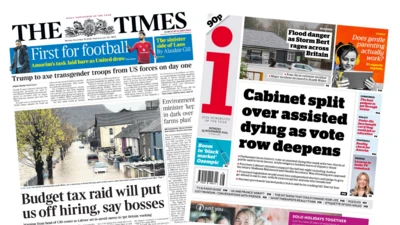We've updated our Privacy and Cookies Policy
We've made some important changes to our Privacy and Cookies Policy and we want you to know what this means for you and your data.
Insurer confusion over drinking and driving
- Author, Bob Howard
- Role, Reporter, Money Box
Should car insurers withdraw cover from people who drink and drive?
Few people would disagree that anyone who is found to be over the drink-drive limit should not be able to make a claim from their insurer for damage to their vehicle or themselves.
But over the past year the wording of some insurance polices has potentially excluded anyone driving "under the influence" of alcohol or drugs.
There are concerns that people with a minimal level of alcohol in their blood or who have taken prescription drugs could be caught out.
Unclear terms
Bob from Cheshire has been insuring his car with Zurich for many years. Recently, he got his renewal quote, which came with a summary explaining recent changes to the firm's terms and conditions.
One new exclusion caught Bob's eye, as having potentially very wide-ranging consequences, as he told Radio 4's Money Box: "It says there will be no cover in force if at the time of an accident the vehicle is being driven under the influence of alcohol or any other substance which would adversely affect a person's ability to drive. It's very draconian. You can still drink a pint of beer and drive within the law."
It is not just people drinking moderate amounts of alcohol who Bob is afraid could get caught out: "You could be taking any kind of prescribed medication which does not render you unfit to drive in the eyes of the law, but in the eyes of Zurich could well negate your insurance."
Bob phoned Zurich to try to clarify what the change meant and whether his fears were justified.
But he says he was told the firm could not comment without a specific case to evaluate. He has now changed insurer after being offered a cheaper quote.
But others share his concerns.
Unintended consequences
Graham Trudgill, from the British Insurance Brokers' Association, says his members have also noticed the changes and are worried about their possible implications: "These exclusions have been creeping into some insurers' policy wordings, to deter drink-driving.
"It could have some unintended consequences. Did someone have to actually be convicted of drink-driving? Could someone be taking medication which could then invalidate their insurance?"
In fact, Graham's members were so worried that his association contacted Zurich to express its concerns.
Zurich decided to back down, as it explained to brokers in a letter: "Our intention behind introducing the exclusion was to deter behaviour that contributes to thousands of road deaths and injuries every year. Whilst we maintain our aspiration to be a socially responsible company, we have listened to feedback provided by brokers. We will now be removing the exclusion completely."
Policy changes
However, although it is no longer an exclusion for policies sold through brokers, it is still there if you buy from the firm direct, hence the new terms and conditions which were sent to Bob last week.
Keith Lewis from Zurich said the firm is now re-examining the wording of its directly-sold policies: "We accept that's not the wording which should be there. What we want to make sure is if anybody is out there drinking and driving and has an accident, that any injury benefit that they're entitled to is only payable if they're law-abiding at the time."
The Association of Chief Police Officers said that its interpretation of "being under the influence" means being over the legal limit.
But other insurers which have tried to introduce similar clauses have backed down completely. Allianz withdrew the exclusion for all its policies just three weeks after introducing it.
The firm told Money Box: "We would certainly agree that compensating someone for the damage sustained to their own vehicle if they were under the influence of drink and/or drugs is less than satisfactory from a road safety perspective. But you could make the same argument for policyholders who were speeding or committed some other road traffic offence where this clause is not invoked."
The Road Traffic Act states insurers still have to pay out for third party claims, even if an insurer tried to exclude you from cover on the grounds of that you were under the influence of drink or drugs.
is broadcast on Saturdays at 12:00 GMT onand repeated on Sundays at 21:00 BST. You can listen again via theor by downloading Money Box.
Top Stories
More to explore
Most read
Content is not available








